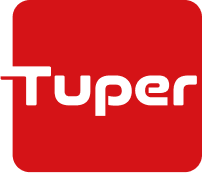Offering Brazilian Sign Language (Libras) courses to employees is one way to promote inclusive communication. Libras is a language that facilitates communication with deaf individuals, reducing the feeling of isolation for employees, customers, suppliers, or the general public.
According to the 2010 census, at that time, there were approximately 10 million hearing-impaired individuals in Brazil, with a significant portion of them using Libras to communicate effectively, as they couldn’t rely solely on spoken communication. Ignoring the communication needs of these individuals means missing out on important opportunities in the corporate world.
The idea of creating a communication improvement channel to better accommodate deaf employees at Tuper came from observing situations within the company, as recounted by Raquel Bollmann, the coordinator of people management. “We already had a deaf person in the HR team, and even though they were integrated, they wished to communicate more. At the time, I also spoke with a supervisor in the exhaust department who wanted to improve communication within the team for a deaf colleague in that department to interact more with coworkers. From there, we decided to seek partners to organize and teach a Libras course within the company,” she explains.
According to the coordinator, the team thought there might be difficulties in reaching the necessary number of students, but the result was surprising due to the demand, and two classes were created. Raquel emphasizes the importance of internal awareness so that the entire community of employees understands that differences should not hinder professional or interpersonal relationships. She believes that, gradually, everyone can learn to handle this demand to welcome people with disabilities in the best possible way. “It’s a learning process and requires constant adaptations,” she says. She considers the project a success, and the company is already considering continuing the project in 2022.
The role of HR is crucial in the inclusion process
Encouraging Libras learning among employees is an excellent way to contribute to social inclusion and integrate deaf individuals, making the company more accessible and socially responsible. Therefore, it is important to have employees prepared to communicate in Libras to, among other benefits, alleviate isolation and facilitate processes like recruitment, training, and feedback.
Actions range from greeting deaf individuals properly to having an interpreter for participation in meetings, for example. People with hearing disabilities feel comfortable working for a company that values and respects them through the promotion of Libras.
Recruitment and selection analyst Denise Gonçalves de Andrade reports that she sought a partnership with SESI in São Bento do Sul (SC – Brazil) to implement the Libras course in the company. Initially, two classes with 35 participants each were offered, which was considered a positive number for a first initiative. “It is essential to understand the possible adaptations to reduce communication barriers, so we can receive and integrate deaf individuals into our workforce so they can perform their duties appropriately,” she says. Denise acknowledges that ongoing internal work with all employees is necessary for everyone to learn to coexist positively with differences. She points out that one of the measures taken was hiring a deaf employee who, starting in January 2022, will be part of the occupational safety team. The new team member can contribute greatly with ideas to expand adaptation methods and raise awareness among all for harmonious coexistence.
Teams ready to coexist with equality
The desire to communicate better motivated Carlos Alexandre Martins, supervisor of logistics operations, to enroll in the course. Carlos reports that he would like to have a deaf colleague in his department but recognizes that there is still much to prepare. “Measures need to be taken before hiring to avoid frustrating the professional, and the team should also be prepared to welcome a deaf colleague. Disability should not be a limitation to professional growth,” he says. Carlos admits that he is not yet fluent in communication, but with the lessons, he has gained a good foundation and wants to improve. For him, the course provided a unique experience of encountering a reality he was not familiar with, including hearing from guests who shared their experiences with the students. “It’s impossible not to be moved by the stories of difficulties and overcoming. I hope to do my part to make deaf people feel included,” he concludes.
About Tuper
Tuper is one of the largest steel processors in Latin America. With over 50 years of history, the company boasts one of the most advanced technological setups for forming steel tubes, with eight business units across three industrial plants and a processing capacity of 826,000 tons of steel per year. In addition to the original automotive sector, the company also operates in the exhaust and catalytic converter sectors (for the replacement market), industry, oil and gas, construction, and agribusiness. The extensive portfolio includes black and galvanized carbon steel tubes for industrial, structural, and conduit applications, drawn tubes, API tubes for the oil and gas market, galvanized conduits, quick-connect tubular piles for foundations, structural metal profiles, automotive parts and components, original vehicle exhaust systems, replacement market automotive exhausts, metal roofing systems, ribbed composite slabs, scaffolding, props, wall coverings, and slitters for construction applications.
Learn more about Tuper.


















